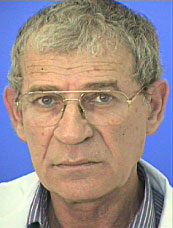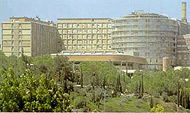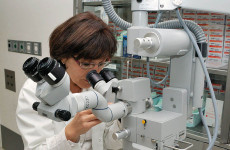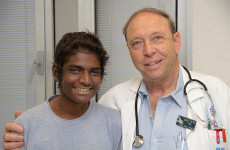
Oded Abramsky was born in Jerusalem. He received M.D. and Ph.D. degrees from the Hebrew University of Jerusalem. He did his residency in Neurology at the Hadassah University Hospital and became Board Certified in Neurology in 1973. In 1981-1988 he was the Chairman of the Division of Neurology and Neurosurgery in the Hebrew University Hadassah Medical School. In 1982 he was appointed Head of the Neuroimmunolgoy Unit at Hadassah Medical Organization, and Professor of Neurology at the Hebrew University of Jerusalem.
In 1988-2005 he served as the Head of the Department of Neurology in hadassah Hebrew University Hospital. He holds the Israel S. Wechsler Chair in Neurology. In 1987-1992 he was the Chief Scientist of the Israeli Ministry of Health and Chairman of the National Medical Research Organization. In 1992-1996 he served as the Dean of the Faculty of Medicine of the Hebrew University in Jerusalem, and Chairman of the Association of Medical Deans in Israel. In 1999 Abramsky was appointed Chairman of the Agnes Ginges Center for Human Neurogenetics at Hadassah. In 2002 he was honored “Man of the Year in Medicine” by Lion’s Israel. He is an Honorary President of the Israel Society of Neuroimmunology; Honorary Member of the American Neurological Association (2003); Foreign Associate Member of the Institute of Medicine of the National Academy of Sciences USA (2004); Honorary Fellow of the Royal College of Physician UK (FRCP) (2006).

In Israel, Abramsky served also as: Chairman of the Medical Advisory Board of the Israel Multiple Sclerosis Society; Chairman of the Committee for Basic Medicine of the Israel National Academy of Sciences; Chairman of the Committee for Neuroscience of the Israel National Council for R&D; Chairman of the ad hoc Advisory Committee of the Ministry of Science for the Evaluation of the Israel National Academy of Science. He was a member in: the National Committee for biotechnology; Board of Governors, The Israel National Institute for Health Services Research; National Council for Health; Executive Committee, Israel Medical Association Scientific Council. He serves as a member in: the National Advisory Committee for the Research Institutes of the Government of Israel; The Advisory Committee for Drugs and Medical Technologies, the Ministry of Health.
Other international positions: Chairman of the Board of Governors of the U.S-Israel Binational Science Foundation. President of the European Committee for Treatment and Research in Multiple Sclerosis. Chairman of the International Congress of Neuroimmunology (1990); of the European Congress on Multiple Sclerosis (1995); and of the European Neurological Society Congress (2000). Member of the Publication and Steering Committees of the World Federation of Neurology. Member of the International Advisory Board of “Harrison’s Principles of Internal Medicine”, McGraw-Hill.
During reserve military service he was a Divisional Staff Medical Commander, and later was appointed Colonel and Assistant Commander of Research and Development (R&D) of the Israel Defense Forces (IDF) and the Ministry of Defense, and the Director of the “Man in Combat” project.
Abramsky published four books and over three hundred scientific articles. He was/ is a member of the Editorial Board of twelve international scientific journals, of the Board of five scientific international societies, and of the Board of Directors of seven Biopharmaceuticals and R&D companies.
Research

The main clinical and scientific interests of Oded Abramsky are in the field of clinical and experimental neuroimmunology with a focus on autoimmune neurological diseases. He was one of the first scientists to establish the field of neuroimmunology and to demonstrate immune pathogenesis in various neurological diseases of the central nervous system (CNS), peripheral nervous system (PNS) and muscle.
A major project was the proof that myasthenia gravis (MG) is an autoimmune disease against the acetylcholine receptor (AchR) at the neuromuscular junction (NMJ). He induced experimental autoimmune MG (EAMG) by active immunization with purified AchR and by passive transfer with AchR-sensitized lymphocytes. He demonstrated specific immune response to AchR in serum of MG patients. Abramsky showed beneficial effect of corticosteroids and chemotherapy on EAMG and this served as a guideline to successful immunotherapy of MG and many other autoimmune diseases. In addition to the studies on MG, which subsequently led scientists to show that some other organ specific disorders also have autoimmune pathogenesis, Abramsky studied immune aspects of other PNS and CNS diseases. In the PNS: he isolated and characterized two myelin basic proteins (MBP), one specific to the PNS and the other specific to both PNS and CNS. Immunization with MBP1 and passive transfer of MBP1-sensitized lymphocytes to animals induced experimental autoimmune neuritis (EAN), while similar procedures using MBP2 induced both EAN and experimental autoimmune encephalomyelitis (EAE). Immune response to the antigens was demonstrated in patients with acute disseminated encephalomyelitis (ADEM), transverse myelitis, polyneuritis (Guillan-Barre’ Syndrome) and mononeuritis. In the CNS: he isolated oligodendrocytes from brain, characterized biochemical and immunological properties, and indicated the possible importance of these myelin producing cells and their antigens in the immune pathogenesis of multiple sclerosis (MS).
Abramsky described a prominent improvement in the course of MS, as in other autoimmune diseases, in pregnant women during the second half of gestation. Subsequently he and his colleagues demonstrated the inability to induce an experimental autoimmune disease in pregnant animals. They found that amniotic fluid and umbilical cord serum have the ability to suppress EAE, EAN and EAMG, and that the active molecule is the pregnancy-associated alpha-fetoprotein (AFP). He showed immunosuppressive effect of purified AFP in vivo and in vitro, and subsequently a phase II clinical study with rhAFP in autoimmune diseases is being done nowadays. In addition, Abramsky showed the importance of various hormonal and biochemical factors on the course of clinical and experimental autoimmune diseases; one example is the effect of hypothalamic influence through the interaction between the immune and the neuroendocrine systems. Also, Abramsky and his colleagues described the effect of the novel immunomodulatory agents, Linomide and Laquinomide, on EAE and EAMG, and on MS and other autoimmune diseases. They also described the beneficial effect of transplantation of various stem cells on demyalination and inflammation in EAE. A new major research project is on the possible immune mediated pathogenesis of some degenerative brain diseases. Abramsky et al. found antibodies to some neuronal antigens (tau, amyloid, synuclein, etc’) in patients with neurodegenerative disease (Alzheimer’s, FTD, DLBD, Parkinson’s). They were able to induce experimental autoimmune encephalitis with clinical and pathological features of cognitive impairment and neuronal tauopathy in animals immunized with the antigen tau. They showed beneficial effects of immunosuppressive agents on this model. These studies may lead in the future to new strategies for the treatment of common neurodegenerative diseases.




